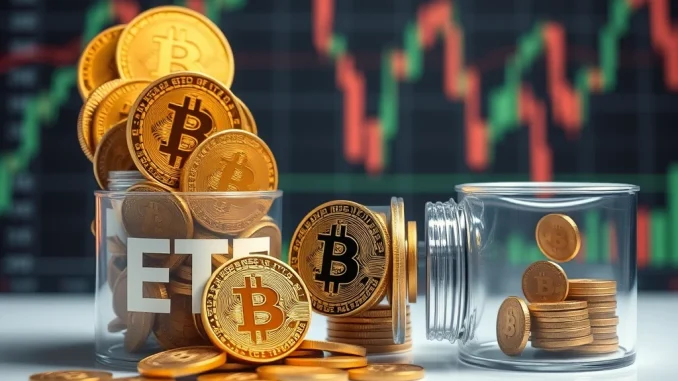
Hold onto your hats, crypto enthusiasts! The U.S. spot Bitcoin ETFs market just witnessed a rather dramatic turn of events. After weeks of positive momentum, April 16th brought a wave of net outflows, totaling a significant $170.77 million. Yes, you read that right – outflows! Let’s dive into what happened and what this could mean for the future of Bitcoin ETFs and the broader crypto market.
Understanding Bitcoin ETF Outflows: What Happened on April 16th?
On Tuesday, April 16th, the collective U.S. spot Bitcoin ETFs experienced a notable shift in investor sentiment. According to data shared by Trader T (@thepfund) on X, the day saw a combined net outflow of $170.77 million. This figure represents the difference between the amount of money flowing into these ETFs versus the amount flowing out. A negative number, like in this case, indicates that more investors withdrew their funds than deposited new ones. But let’s break down which ETFs were most affected and who bucked the trend.
| ETF Provider | ETF Ticker | Net Flow (USD Million) |
| Fidelity | FBTC | -$113.80 |
| ARK Invest | ARKB | -$113.25 |
| BlackRock | IBIT | +$30.99 |
| Bitwise | BITB | +$12.81 |
| Invesco | BTCO | +$6.74 |
| Grayscale | GBTC (Mini) | +$3.36 |
| VanEck | HODL | +$2.38 |
| Others | Various | No Change |
Spot Bitcoin ETF Performance: Leaders and Laggards in ETF Flows
As the table above illustrates, the bulk of the ETF outflows came from Fidelity’s FBTC and ARK Invest’s ARKB. These two funds alone accounted for over $227 million in outflows, significantly outweighing the inflows seen in other spot Bitcoin ETFs. Fidelity’s FBTC experienced net outflows of $113.80 million, closely followed by ARK Invest’s ARKB with $113.25 million in net outflows. These are substantial figures, especially considering the relatively short lifespan of these ETFs since their approval in January.
However, it wasn’t all doom and gloom across the board. BlackRock’s IBIT continued its impressive streak of inflows, adding another $30.99 million to its holdings. Bitwise’s BITB also saw a healthy inflow of $12.81 million. Smaller inflows were also recorded for Invesco’s BTCO ($6.74 million), Grayscale’s mini BTC ETF ($3.36 million), and VanEck’s HODL ($2.38 million). Interestingly, the remaining Bitcoin ETFs reported no changes in their holdings on April 16th, suggesting a mixed bag of investor activity.
Why the Sudden Shift to Bitcoin ETF Outflows?
The million-dollar question is, of course, why did we see these significant Bitcoin ETF outflows on April 16th? Several factors could be at play:
- Profit Taking: After a period of price appreciation for Bitcoin and strong inflows into ETFs, some investors might have decided to take profits off the table. This is a common market behavior, especially after rallies.
- Market Volatility: The crypto market is known for its volatility. Uncertainty or negative price movements in Bitcoin could trigger investors to reduce their exposure, leading to outflows from ETFs.
- Macroeconomic Factors: Broader economic conditions, such as interest rate expectations, inflation data, or geopolitical events, can influence investor sentiment across all asset classes, including crypto. Risk-off sentiment in traditional markets can sometimes spill over into the crypto space.
- Rotation into Other Assets: It’s possible that investors are reallocating capital from Bitcoin ETFs into other investment opportunities, whether within the crypto space (like other cryptocurrencies or DeFi) or traditional markets.
- Fund-Specific Reasons: Outflows from specific ETFs like FBTC and ARKB could also be due to fund-specific factors, such as portfolio rebalancing or changes in investor mandates for those particular funds.
The Bigger Picture: What do ETF Flows Indicate About Bitcoin’s Future?
While a single day of net outflows is noteworthy, it’s crucial to consider the broader trend. Since their launch, U.S. spot Bitcoin ETFs have generally seen net inflows, reflecting strong institutional and retail demand for Bitcoin exposure through regulated investment vehicles. This one day of outflows doesn’t necessarily signal a long-term trend reversal. Market corrections and periods of profit-taking are normal parts of any investment cycle.
However, sustained or increasing ETF outflows could be a cause for concern, potentially indicating waning investor interest or a shift in market sentiment. Conversely, a quick return to net inflows would reaffirm the underlying bullish narrative for Bitcoin and its accessibility through ETFs.
Actionable Insights for Crypto Investors
So, what should crypto investors take away from this episode of Bitcoin ETF outflows?
- Don’t Panic: One day of outflows doesn’t make a trend. Avoid knee-jerk reactions based on short-term market fluctuations.
- Monitor ETF Flows Regularly: Keep an eye on daily and weekly ETF flow data to gauge investor sentiment and potential shifts in market dynamics.
- Consider the Macro Context: Stay informed about broader macroeconomic factors that could influence Bitcoin and crypto markets.
- Diversify Your Portfolio: Don’t put all your eggs in one basket. Diversification across different asset classes and crypto investments can help mitigate risk.
- Do Your Own Research: Always conduct thorough research before making investment decisions. Understand the risks and potential rewards of Bitcoin and crypto investments.
Conclusion: Navigating the Evolving Landscape of Bitcoin ETFs
The $170.77 million net outflow from U.S. spot Bitcoin ETFs on April 16th serves as a timely reminder of the crypto market’s dynamic nature. While the outflows from FBTC and ARKB were significant, the continued inflows into IBIT and BITB, along with others, suggest a more nuanced picture. The Bitcoin ETF market is still relatively young, and we can expect to see periods of both inflows and outflows as it matures. Staying informed, understanding market dynamics, and maintaining a long-term perspective will be key for navigating this exciting and evolving investment landscape.



